Other Publications
Elisabete Martins
Call for Paper | XLVII International Conference on Regional Science: Challenges, policies and governance of territories in the post-covid era,October 19-21, 2022, Granada, Spain
XLVII International Conference on Regional Science (Reunión de Estudios Regionales – RER), which will take place at the Universidad de Granada on October 19, 20 and 21, 2022.
Dear colleagues,
The abstract submission for the XLVII Meeting of Regional Science and the XIII Andalusian Conference of Regional Science, organized by the Spanish and Andalusian Associations of Regional Science, is open. The Conference will be held at the University of Granada from 19th to 21nd of October 2022, with the organizative support of the Interuniversity Research Institute for Regional Development (IDR) and the Joint Research Centre (JRC) of the European Commision.
The main topic of this XLVII edition is: “Challenges, policies and governance of the territories in the post-covid era”. We focus on the main territorial challenges we face after the pandemic and on the need for coordination among the actors that design and implement policies. The pandemic has revealed the existence of inequalities and of severe differences across territories. It has risen asymmetries in factor endowment and unemployment and has altered the whole industrial structure, especially in peripheral areas. It has fostered migration and urban concentration processes, too. In sum, the pandemic has brought new economic, social and environmental concerns.
As in previous editions, the submission of results of on-going research without a full paper will be welcomed. To be considered by the Scientific Committee these submissions should have a minimum length of 1,500 words. Here you can find the templates and more information on the Conference.
Unpublished papers written by researchers under 33 years or who defended their PhD thesis during the two years prior to the Conference are eligible for the Juan Ramón Cuadrado Young Researchers' Prize. The jury of that prize will be the Scientific Committee of the Conference. The authors of the paper awarded will receive an accreditation for the award and a gift.
PhD students in the first stages of their dissertations and master's degree students with a research orientation will have reduced registration fees to facilitate their access to the parallel sessions of the Conference and their participation in the special session for young researchers. There they will have the opportunity to briefly present their research ideas.
The Organizing Committee invites you to propose Special Sessions for the Conference. Proposals can be made from now until May 15th and they will be published once they are approved by the Scientific Committee and the Organizing Committee. To make a proposal It is necessary to send the title of the session and the name of the coordinator or coordinators as well as a brief description to the Secretariat of the Conference: This email address is being protected from spambots. You need JavaScript enabled to view it.. It is recommended that a session has a minimum of four contributions. In the case of sessions with a high number of contributions, these will be scheduled in accordance with the coordinators criteria.
We are looking forward to having the opportunity to welcome you in Granada.
Greetings,
The Local Organizing Committee
Opening: Professor and Head, Department of Agricultural and Consumer Economics (ACE)
Professor and Head, Department of Agricultural and Consumer Economics (ACE)
The Professor and Head of the Department of Agricultural and Consumer Economics (ACE) is a full-time administrative position in the College of Agricultural, Consumer and Environmental Sciences (ACES) at the University of Illinois at Urbana-Champaign. This position is responsible for the administration of the research, teaching, extension, outreach, and international activities of the Department of Agricultural and Consumer Economics.
More details available here: https://jobs.illinois.edu/academic-job-board/job-details?jobID=161848&job=aces-professor-and-head-department-of-agricultural-and-consumer-economics-161848
Winners RSPP Paper Award
Prof. Tomaz Dentinho, EiC, and the RSPP editorial team picked up two winners of the 2022 RSPP Best paper award. The two winning papers are as follows:

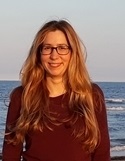 Eveline S. van Leeuwen, Solmaria Halleck Vega and Vera Hogenboom (2021) - Does population decline lead to a "populist voting mark-up"? A case study of the Netherlands. Regional Science Policy Practice 13(2), 279–301.
Eveline S. van Leeuwen, Solmaria Halleck Vega and Vera Hogenboom (2021) - Does population decline lead to a "populist voting mark-up"? A case study of the Netherlands. Regional Science Policy Practice 13(2), 279–301.
"The paper aims to analyze the impact of depopulation, the context and the party programs on election results in the Netherlands. It is a very interesting and robust paper with a promising impact on methodology, public participation, policymaking and regional development."
AND




 Emerson Gomes Santos, Renato Garcia, Veneziano Araujo, Suelene Mascarini and Ariana Costa (2021) - Spatial and non-spatial proximity in university– industry collaboration: Mutual reinforcement and decreasing effects. Regional Science Policy Practice 13(4),1249–1261.
Emerson Gomes Santos, Renato Garcia, Veneziano Araujo, Suelene Mascarini and Ariana Costa (2021) - Spatial and non-spatial proximity in university– industry collaboration: Mutual reinforcement and decreasing effects. Regional Science Policy Practice 13(4),1249–1261.
"The paper examines the role of the proximity between university and the industry to explain innovation in Brazil. It is a very interesting paper links cognitive proximity with innovation in a developing country."
Congratulations to the prize winners on their achievement!
ERSA Summer School 2022 | Call for Application: Extended deadline until the 24th March 2022
|
Member features for June Issue of NARSC Newsletter

NARSC Update
Calling upon all North American Regional Scientists
As noted last year, we would like to feature the research and contributions to the field of regional science by our members each year in the June Issue of the NARSC Newsletter.
To ensure an inclusive process and broad representation, we invite you to nominate yourself or someone you know to be featured in the June 2022 NARSC Newsletter. Everyone is welcome! Nominees can be PhD candidates up to emeritus professors but need to be members of NARSC or one of its regional associations. We especially encourage nominations of researchers belonging to underrepresented groups in NARSC and their contributions to the field of regional science.
These will be short features that will consist of questions regarding your relationship to/involvement in NARSC, your research and how it contributes to regional science, and important future research directions by regional scientists in your subfield.
We hope to receive a lot of nominations! Depending on the number of nominations, we may have to make a selection based on the goal of having as many diverse voices as possible heard and at the same time keeping the newsletter to a reasonable length.
To nominate yourself and/or someone you know, please email Isabelle Nilsson (This email address is being protected from spambots. You need JavaScript enabled to view it.) your name (or the name of the person you are nominating), affiliation, and email address by April 1.
ERSA Summer School | Less than one week left to apply
|
REMINDER | Nominations to RSAI Fellows – Deadline: April 15, 2022
Dear RSAI members,
I hope this email finds you well.
I am writing you to remind you of the possibility to nominate a member of the Association as RSAI Fellow.
As discussed on the dedicated web page (https://www.regionalscience.org/index.php/awards/rsai-fellows.html), RSAI Fellows "are distinguished scholars with a proven and recognized research record in the field of regional science during a considerable part of their scientific career. Such honoured members of the RSAI are appointed after a careful nomination and selection procedure, based on a broad consultation of the RSAI membership." Let me remind you that every RSAI member in good standing can be nominated, although no self-nomination, or a nomination by another Fellow, is allowed. Candidatures will be screened by a dedicated committee, and elections will be subsequently made based on the votes of the RSAI Fellows.
The deadline for this year's nominations is set at Apr. 15.
Thank you all in advance for your attention,
Kind regards,
Call for applications | The Peter Nijkamp Research Encouragement Award
Call for applications
The Peter Nijkamp Research Encouragement Award
The award recognizes the outstanding potential of a mid-career researcher from a nation in the developing world in which there is a section of RSAI. Conditions for applications are:
- No more than 10 years from the doctoral qualification (by Dec 31, 2021);
- Live in developing nations continuously for at least three years as at Dec 31, 2021;
- Be a member of RSAI in good standing;
- Submit a written formal research paper on a topic in Regional Science;
- Submit an updated version of CV.
All material must be submitted to the This email address is being protected from spambots. You need JavaScript enabled to view it.
Nominees will be judged in part on the evaluation of the paper and in part on an evaluation of the research track record and performance (CV).
The winner(s) will receive support, up to 750 Euro, to participate in a Supra-Regional meeting or in the World Congress, at which the paper will be presented.
The jury will comprise the Immediate Past-President of RSAI as Chair, an Editor of Papers in Regional Science, and two RSAI Fellows.
Deadline for the applications: April 15, 2022.
Call for Abstracts | 16th NECTAR Conference, July 20-22 2022,Toronto (Canada)
16th International NECTAR Conference Toronto, Canada, 20 - 22 July 2022
Mobilizing Justice: Moving Toward Action for an Equitable Transportation Future
General Call for Papers – Extended Deadline
Transportation systems, networks, and infrastructure are the critical link that connects people to their daily social, economic, and health activities. However, the quantity and quality of transportation opportunities available vary significantly from place to place, and often lead to the phenomenon known as Transportation-Related Social Exclusion (TRSE).
The conference calls for presentations on advancements in the fields of transport, communication, and equity. The focus of the conference is transportation equity and TRSE, and how 21st century cities and regions are addressing these important topics in a post-COVID-19 world. For example, presentations may discuss how transport policies enable or prevent access to opportunities, present emerging ways of measuring transport-related disadvantage and its downstream effects, or explore the intersectional experiences of individuals with transportation systems and networks.
We invite papers discussing the following specific topics of interest:
- Economic, social, and health impacts of suppressed or excess travel
- The multiple dimensions of access to opportunities (barriers/constraints)
- Distributional impacts of transportation infrastructure investment
- Equity and environmental impacts of logistics and freight
- New transport technologies, curbside management, and equity
- Digital barriers to transportation and solutions
- Analyses of policy interventions on transportation equity and social inclusion
- Intersectional approaches to experiences and perceptions of people related to mobility and accessibility
- Professional or academic applications of theoretical approaches to equity (prioritarianism, sufficientarianism, egalitarianism, etc.)
- Innovative data collection to advance equity
In addition to these topics, we welcome papers on topics in the fields of transport, communications, and mobility at large. General topics of interest include transport and infrastructure evaluation, transport policy and environment, logistics and freight, tourism, recreation and leisure, housing and labour markets, accessibility analysis, social and health issues, and ICT.
The different NECTAR clusters will also organize specific thematic sessions. Calls for papers for these sessions will be posted on the conference website and the NECTAR website.
Deadline for abstract submission: March 14, 2022. Abstracts should be submitted electronically, using the form available on the conference website and following the instructions found there:
https://nectar2022.artsci.utoronto.ca
Criteria for acceptance
Criteria for acceptance are scope, scientific quality, NECTAR membership and the possibility to fit the presentation in a coherent conference session. We allow one paper presentation per participant.
Venue
The NECTAR conference will be organized by the University of Toronto and hosted on its downtown St. George campus. Founded by royal charter in 1827, the University of Toronto is Canada’s largest and top-ranked university, located in a growing global city with direct air connections to over 60 countries.
Participation and NECTAR membership
Registration, meals, and accommodation for one night will be offered to NECTAR members, for only one author per paper. One night of hotel accommodation will be offered to participants who have confirmed their participation before May 31, 2022. One night of hotel accommodation might be charged in case of late cancellations. All practical details will be communicated through the conference website. In order to participate in the conference, a consecutive and current two-year NECTAR membership is necessary (2021-2022). Non-members can find details of how to join the association on the “Membership” page of NECTAR’s website: www.nectar-eu.eu/membership.
COVID-19 considerations
For most travelers, entry into Canada requires proof of full vaccination. In addition, the University of Toronto requires proof of full vaccination for many activities that occur on campus. Please refer to the NECTAR 2022 conference website for up-to-date COVID-19 related requirements.
Important dates:
Abstract submission: March 14, 2022
Notification of acceptance: March 31, 2022
Confirmation of attendance: May 31, 2022 We look forward to seeing you in Toronto!
NECTAR is a European-based scientific association. The primary objective is to foster research collaboration and exchange of information between experts in the field of transport, communication and mobility from all European countries and the rest of the world. It is a multidisciplinary social science network bringing together a wide variety of perspectives on transport and communication problems and their impacts on society from an international perspective. For further information on NECTAR, use the link: http://www.nectar-eu.eu.
The Annals of Regional Science, Volume 68, Issue 1 - New Issue Alert
|
|
||
|
|
|||
|
|
|
|
|||
|
|
|
|
|||
|
|
|
|||
|
|
|
|||
|
|
|
|
|||
|
|
|
|||
|
|
|
|||
|
|
|
|||
|
|
|
|
|||
|
|
|
|||||
About Us
The Regional Science Association International (RSAI), founded in 1954, is an international community of scholars interested in the regional impacts of national or global processes of economic and social change.


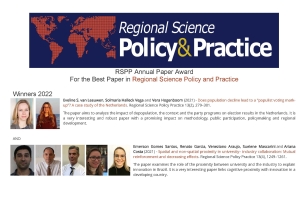
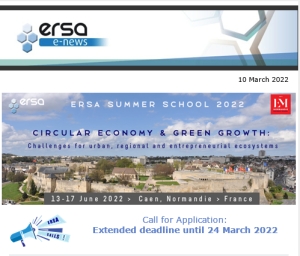


 Call for Application:
Call for Application: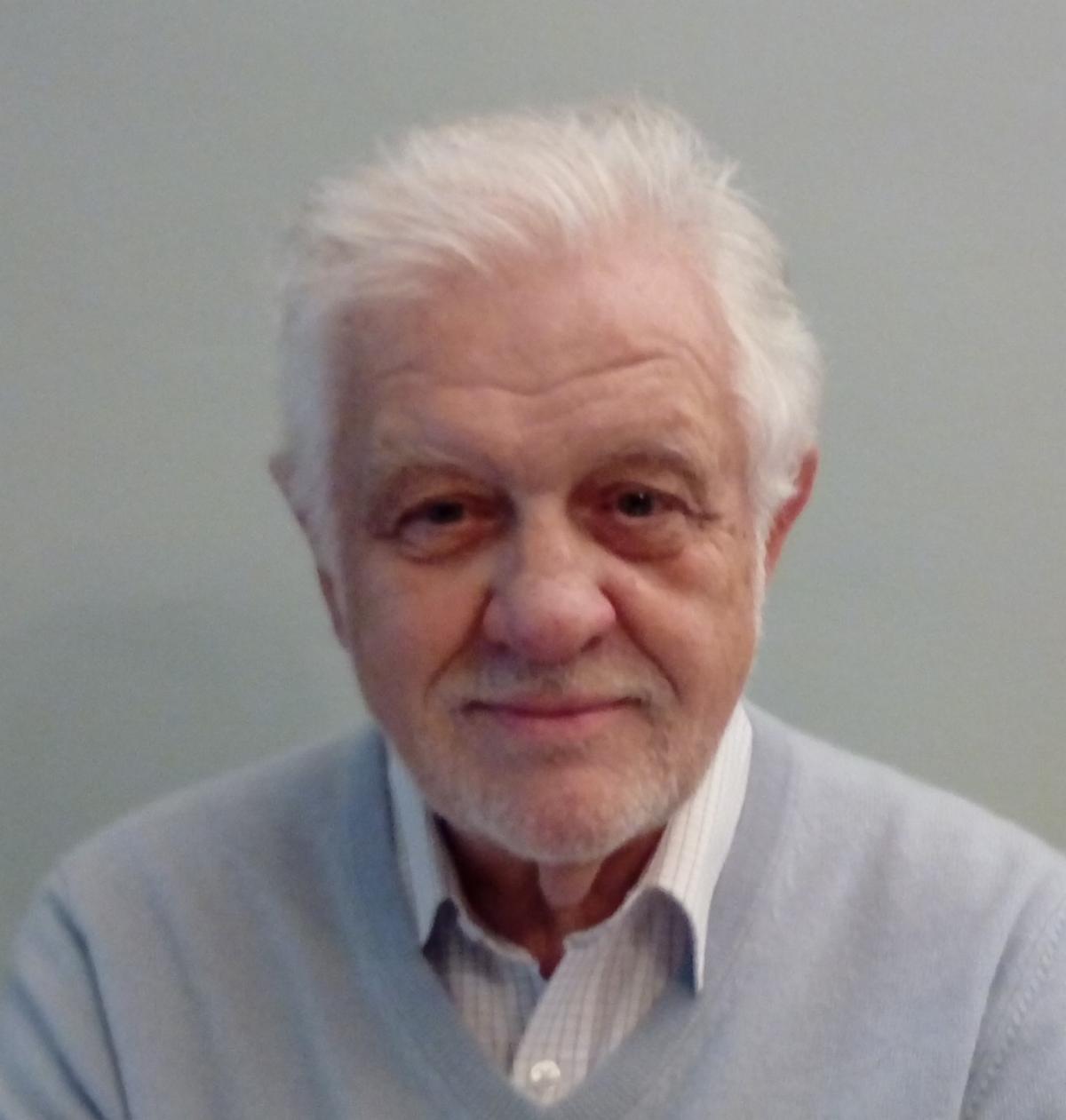 Claude Lacour is Professor Emeritus of Economics at the University of Bordeaux and past president of the French speaking regional science association. He is a specialist in urban and spatial economics, with a strong focus on other disciplines. As a teacher, he deeply believes in the virtues of learning and transferring knowledge and know-how, and methodologies.
Claude Lacour is Professor Emeritus of Economics at the University of Bordeaux and past president of the French speaking regional science association. He is a specialist in urban and spatial economics, with a strong focus on other disciplines. As a teacher, he deeply believes in the virtues of learning and transferring knowledge and know-how, and methodologies.
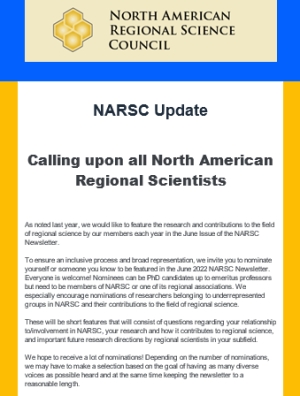
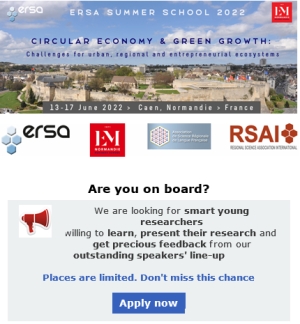
 We are looking for smart young researchers willing to learn, present their research and get precious feedback from our outstanding speakers' line-up
We are looking for smart young researchers willing to learn, present their research and get precious feedback from our outstanding speakers' line-up

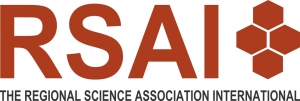
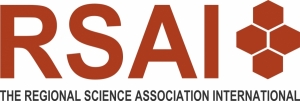
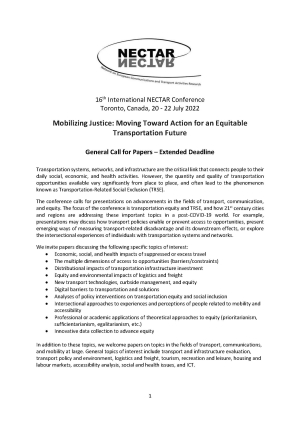
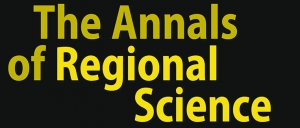
 The Annals of Regional Science.
The Annals of Regional Science.